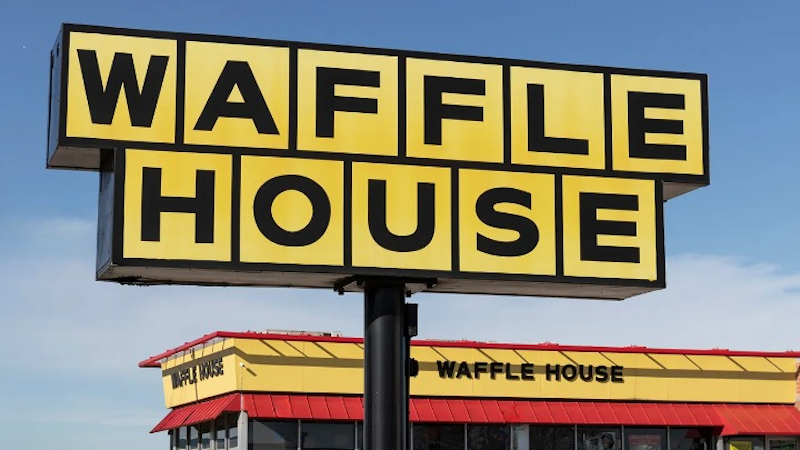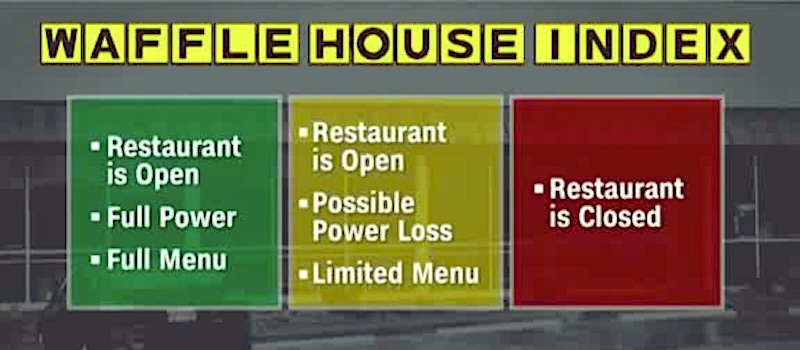How well do you cope when confronted with a crisis?
Are you able to remain calm amidst the chaos?
Can you make effective and efficient decisions when you’re stressed?
The ability to shine when things appear to fall apart is a trait that often separates the great leaders from the rest.
I want you to be great. So I’m going to give you a little nibbling of advice on what you can do to get there.
It starts with two words:
Waffle.
House.

All Waffle House All The Time
In case you’ve been living under a short stack of pancakes all your life, Waffle House is a 24-hour diner that is primarily located in the southern states here in the US of A.
Choose any part of the country that’s prone to tornados or hurricanes, and odds are you’ll find Waffle House restaurants nearby.
Every Waffle House is open all the time.
And I mean All. The. Time.
In fact, the company prides itself on its ability to keep its restaurants open. As well they should. They’re pretty darn good at it.

How Waffle House Deals With Crisis Management
Waffle House is like the Terminator of restaurants. No matter what artillery you throw at it, no matter how hard you try to destroy it, it just keeps going.
It’s all a result of their conscious concern for crisis management.
In fact, you can’t spell “crisis management” without the Waffle House Jump Teams.
[Editor’s Note: actually, you can] The Waffle House Jump Teams are like a version of Seal Team Six but with less seals and more waffles. The moment a potential disaster is brewing in one of the Waffle House regions, the Waffle House Jump Teams jump into action.
Faster than you can say “extra gravy on my biscuits”, they storm into the impacted region with generators, pans, batter, and butter and they ensure that the Waffle House stays serving at full speed despite the chaos around them.
In some of the worst catastrophes, it only takes a few hours to get the restaurants back in business.
It can easily be argued that Waffle House is the best when it comes to maintaining calm amidst crisis.
This is one reason why FEMA uses the Waffle House as a way to rank the severity of a catastrophe.
It’s called the Waffle House Index

The Waffle House Index
The Waffle House Index has three levels:
Green = full menu
Yellow = limited menu
Red = closed
[Editor’s Note: don’t confuse these with your inner traffic signal] As a former head of FEMA once said, “If you get [to a disaster zone] and the Waffle House is closed, that’s really bad.”
But it’s not just during a disaster that the Waffle House is important. If your local Waffle House closes before the potential disaster even occurs, it’s time to get the heck out of Dodge as fast as you can.
More importantly, the status of the Waffle House is a barometer of both the damage done to an area as well as the speed at which the area can achieve economic recovery.
That’s how important Waffle House’s crisis management team influences others.
And this, of course, leads us right back to you.
[Editor’s Note: there should probably be a syrup joke somewhere around here]
Your Sappy Leadership
At some point in your career, things will go wrong. Horribly wrong.
Maybe your most productive employees will suddenly leave the company. Maybe the website will crash. Maybe a global pandemic will hit and you’ll be forced to change your entire business model.
[Editor’s Note: that last one sounds vaguely familiar] Whatever may happen, by the time the crisis hits, it’ll be too late to begin your preparation.
You can’t protect the fan once the s**t has already hit it.
It’s pretty simple to sail a ship in serene seas. You just move forward without much effort. But what are you going to do when that rogue wave bares down on you?
The reason leaders fail in times of crisis is because they haven’t spent the time to create a culture that can quickly adapt to crisis.
But you’re not going to be one of those leaders, right?Riiiiight?!

In Which You Start Thinking About The Next Potential Crisis – With Or Without Waffles
You probably have health insurance in case something goes wrong with your body.
You may have renters or homeowners insurance in case something goes wrong with your living space.
So what type of leadership assurance are you going to create for your team in the instance that something goes wrong at work?
You know what, instead of you taking a stab in the dark, let me tell you what you’re going to do.
You’re welcome.
- THINK: Have a discussion with your key people about what potential crises you may encounter. Make a list. This could include:
- A key member of the team suddenly unavailable
- Communications going down
- Unhappy clients
- You come up with your own list, my limit is three things and I’ve reached my limit.
- BACKUP: For each of the items above, rate your current contingency plans on a scale of 1 to 10, where 1 = “no plan” and 10 = “a fully solidified plan.” Anything below a 7 needs to proceed to #3 below.
- PLAN: Create a contingency plan for each of the items left over from #2 above.
- What should happen?
- How should it happen?
- Who should be accountable for making it happen?
- Make sure the accountable people take this course
- RESPONSIBILITY: Ensure everybody on the team understands where their responsibility starts and ends when it comes to crisis. Don’t mistake the brevity of this description for its lack of importance. This step is probably the single most important one of them all.
- COMMUNICATE: What will be the primary platforms for internal and external communication when a crisis occurs? How will you communicate with each stakeholder and how often? This includes:
- Clients
- Partners
- Customers
- Board members
- Each other
- The relevant authorities
- DECISION-MAKING: What decisions is each person empowered to make? Which decisions are they not empowered to make? See “Responsibility” above.
- WAFFLES: Who is responsible for making the chicken and waffles?
OK, that last one was just to make sure that you were still reading. However, it did suddenly make me hungry. I might be having a breakfast crisis.
The bottom line here is that you are more prone to fail if you don’t prepare for the one thing that will cause you to fail.
Crisis readiness isn’t an option, it’s a necessity.
Don’t just take my advice, take the lead from the Waffle House and make sure you keep that griddle going. After all, those waffles aren’t going to cook themselves when the catastrophe comes.
A Somewhat Relevant Quote
“Anyone can lead when the plan is working. The best lead when the plan falls apart.”“
Robin Sharma – author, speaker, parabolist
